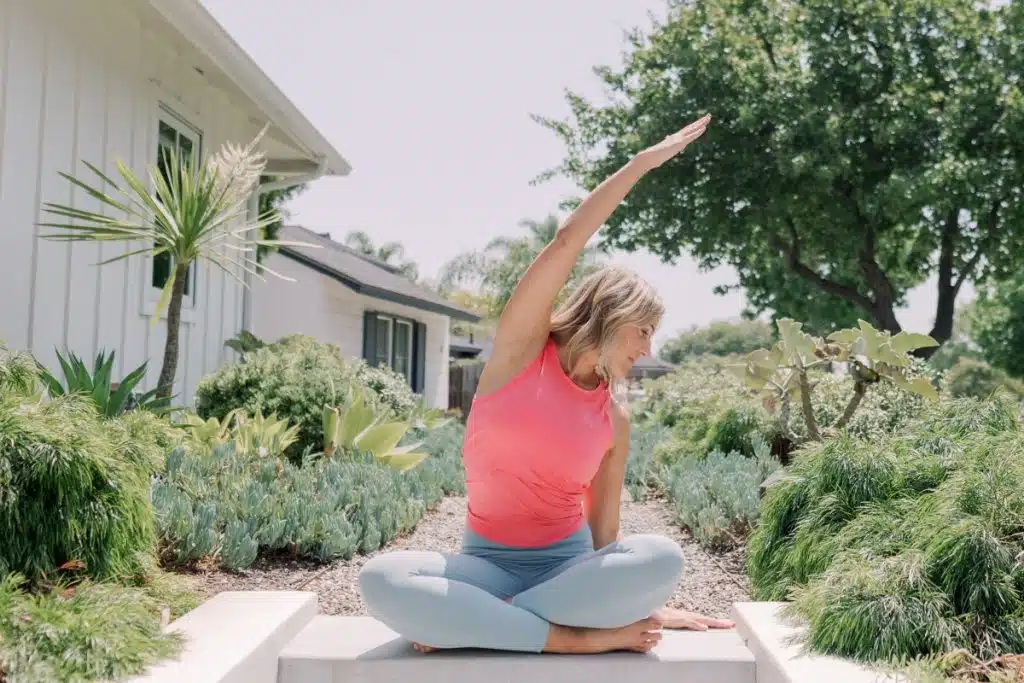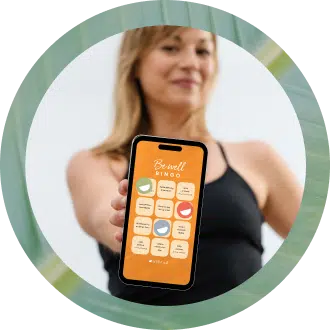
Body disconnection is all too common in a world that has trained women to ignore, repress, and control their bodies. Instead of hearing what your body has to say, you learn to follow external cues and guidance. And I know that maybe this doesn’t sound so bad—why not listen to the experts?—but it is problematic for two reasons:
- There’s a lot of information available today. Unfortunately, not all of it is legitimate or coming from a true expert or research-based source.
- You’ve been taught to do everything with your mind, but the body has a lot to say too. If you’re not listening, you’re missing critical messages that can lead to a happier, healthier life.
I dedicated an entire chapter in my book, Well to the Core, to the importance of listening to your body. This is something that is often left out of health and fitness programs, most of which focus on facts and rules—but don’t leave space to consider the wisdom and needs of your body.
I also explained in my recent blog post, 5 Practical Strategies to Listen to Your Body Each Day, long-term, that sustainable health is only possible when you listen to your own body, and then respond with care and compassion, based on what you know about your body.
Here’s the real kicker: most women aren’t talking about the struggles and pain that come from this disconnection. The solution is just another fix or another diet when really, you need to come back to yourself first.
Let’s go deeper into what I mean when I say body disconnection and why it can feel so hard to talk about. Then I’ll share five questions that will help you understand and talk about body disconnection.

What Body Disconnection Means
While body disconnection can be diagnosed as dissociation, a clinical disorder, what I’m talking about today is something a little different. As humans, we live in three holistic, interwoven states of being: the physical, the mental, and the spiritual. It’s equally important to nourish all of these dimensions, but we often learn at early ages to see our body as a separate object, rather than an innate and beautiful part of our whole selves.
Seeing your body as a separate object means you might:
- Ignore important mind-body connections, like how stress at work is impacting your physical health (ex. You’ve been having chronic headaches or digestive issues).
- Struggle with body image or fall victim to the unrealistic beauty standards of our image-obsessed world.
- Not know when you’re still hungry or comfortably full. When you ignore your body, you miss those cues.
- Find yourself exhausted at the end of the day because you didn’t give yourself the rest your body was asking for.
Many of these may be true for you right now. I’ve been through seasons of life where all of these are true in one way or another. The good news is, it doesn’t have to be this way.
Why Women Aren’t Talking About This
This is an interesting aspect of body disconnection: many women are suffering, yet few people are talking about it. Why? Well, the simple answer is that you may not even recognize it’s happening. After a while, body disconnection can become so automatic that you might not even realize that you aren’t listening to your body. You’ve become so accustomed to listening to your personal trainer or that nutritionist you follow on Instagram that you don’t know any other way.
This is why an important step to unraveling the complex layers of this issue is to have open discussions with other women. The power of connecting with others who are also feeling this way is immeasurable. I know when I open up to my friends, I always feel more connected to myself and less alone.
Plus, it gives you a chance to explore what’s really happening, something you might not do by yourself because let’s be honest, the to-do list is long and the day is short!
If you don’t have this community yet, Lindywell can bridge that gap for you. Start your free trial and get access to our supportive, non-judgmental community on Facebook!
5 Questions to Explore Body Disconnection
If you’re ready to talk with your trusted loved ones, like friends, close relatives or even a therapist, about feeling disconnected from your body—and whether they feel that way too—here are some questions you can use. Think of these as conversation starters to get everyone thinking more deeply and openly about this issue.
1. Why Do We Feel Disconnected from Our Bodies?
This is a multi-faceted question, and the answer can (and probably will) differ for everyone. Some women might disconnect as a result of internalized beliefs around body image while others might disconnect because of an unhealed trauma.
Being open about this with your friends might also help you recognize other reasons why you’ve disconnected that you didn’t realize. The same goes for your friends as you share your experiences.
2. How Does Body Disconnection Make Us Feel?
Many complicated feelings tend to come with body disconnection—shame, insecurity, confusion, mistrust, numbness, depression, anxiety, and more. These emotions are overwhelming to deal with in isolation, but it can be cathartic to express them with others who understand.
Interestingly, emotions are inherently somatic. This means you can feel them manifest in your head, neck, throat, shoulders, chest, stomach, or other body parts. When you feel safe (like with a group of people who love you) to can start to notice, release, and sort through your emotions out loud in real time, it gives you a chance to return to embodiment, which is the opposite of body disconnection.
3. Why Are We Afraid to Trust the Body Connection?
You’ve heard the phrase, “trust your gut,” over and over again, since childhood. So what makes it so difficult to lean into this inner trust?
- If you’ve experienced illness or physical pain, you might be mad at your body or blame your body.
- You may feel as though you “trusted your gut” before and it drove you in what felt like the wrong direction.
- If you’ve felt out of control in your life, controlling your body (rather than surrendering and listening to it) becomes a coping mechanism.
There are so many reasons why you might feel disconnected. Sort through them with your trusted sources who may also feel the same as you.
4. What Are the Impacts of Body Disconnection?
Women who experience body disconnection also have a higher risk of shame, low self-esteem, lack of interoceptive (emotional and sensory) awareness, eating disorders, and other mental health concerns. These consequences can interfere with your life in so many ways that you might not even recognize them.
Being vulnerable about mental health issues can feel daunting, but the more open and honest you are, the lighter you’ll feel. There is power in sharing your burdens with someone else and realizing you aren’t alone in how you feel.
5. How Can We Start Reconnecting to Our Bodies?
This question is arguably the most important: how do we restore the connection to our bodies in order to cultivate a healthier and more holistic relationship with ourselves? When we consider this together as a community, we can help each other find practical, actionable ways to heal and re-establish the inherent physical connection that’s been lost.
Two powerful tools for rebuilding this connection are mindful movement and breathwork—both of which you’ll get immediate access to if you start your free Lindywell trial. With 300+ Pilates workouts and dozens of guided breathwork sessions, you’ll have important resources to come back to your body.
But don’t stop there. Talk with your friends about how they might consider reconnecting with their body. This is also a great exercise in actually listening to your body—when you ask that question, what does it tell you? Maybe you sense the need to slow down or add more play into your life.
The options are endless, so let your friends inspire you, but don’t forget to tune into your own answers.
Healing Our Body Disconnection Happens in Community
In a culture that teaches you to treat your body as a separate object, it’s no wonder you’re feeling disconnected. I want to remind you, however, that it’s never too late to break free and tune into the inner wisdom of your own body once again. This process takes time, after all, you might have to unlearn a lifetime of conditioning. But the journey is so worthwhile—and you are so deserving.







